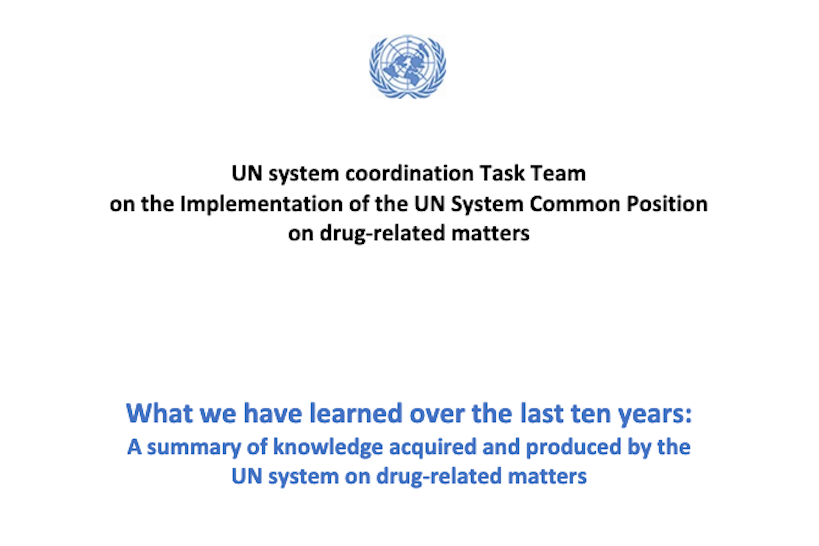Following United Nations (UN) agencies’ decision to adopt common drug policy that endorses decriminalisation of possession and use, the UN System Coordination Task Team has released a new report that says punitive drug policies have proven to be “ineffective in reducing drug trafficking or in addressing non-medical drug use and supply” and that they “undermine the human rights and well-being of persons who use drugs, as well as of their families and communities”.
The report – “What we have learned over the last ten years: A summary of knowledge acquired and produced by theUN system on drug-related matters” – instead endorses policy based on evidence, public health, sustainable development, and respect for human rights.
Transform Drugs Policy Foundation said the report “marks a major shift in collective thinking across the leading UN agencies – and a major victory for civil society reform advocates”.
Rejecting the simplistic conventional wisdom that drug harms should be blamed on individual choices, the report recognises the broader role of complex societal factors and condemns the unnecessary imprisonment and criminalisation of people who use drugs. It also brings up major concerns with supply side enforcement that it says enables organised crime to flourish.

The report also calls for for a range of health and harm-reduction measures, including harm-reduction provision in prisons, gender specific services, heroin assisted treatment, and ‘proportionate and effective policies’ including the diversion of people caught in possession away from criminal justice and into support.
The report was published on Thursday, the opening day of the High Level Segment of the UN Commission on Narcotic Drugs meeting in Vienna, attended by ministers and heads of state from across the globe. While it does not go as far as calling for legal regulation, it establishes clear principles on which drug policy should be based, while leaving no doubt as to the damaging impact of strict prohibition on individuals and communities. How many global leaders responsible for drug policy take note and actually follow its recommendations is another question.
Key quotes:
“…if not based on human rights standards and a solid evidence base, drug policies can have a counterproductive effect on development. Abusive, repressive and disproportionate drug control policies and laws are counterproductive, while also violating human rights, undercutting public health and wasting vital public resources.” (p25)
“Criminalization of drug use and possession for personal use for purposes other than medical and scientific may lead to an increased risk of illness among people who use drugs and a negative effect on HIV prevention and treatment. It can increase stigma and discrimination, police harassment and arbitrary arrests. Higher rates of legal repression have been associated with higher HIV prevalence among people who use injecting drugs, without a decrease in prevalence of injecting drug use. This is likely the result of individuals adopting riskier injection practices out of fear of arrest or punishment.” (p25)
“Zero-tolerance policies, if not properly implemented, may run the risk of generating violence by stigmatizing and enabling the abuse of power to be directed against people who use drugs or low-level players in the drug trafficking chain. This, in turn, can lead to mass imprisonment for low-level offences or to forced detention of people who use drugs.” (p27)
“The assumption that tougher law enforcement results in higher drug prices and therefore lowers the availability of drugs in the market is not supported by the empirical evidence. … although prohibition itself raises prices far above those likely to pertain in legal markets, there is little evidence that raising the risk of arrest, incarceration or seizure at different levels of the distribution system will raise prices at the targeted level, let alone retail prices. Drug seizures themselves cannot generally be expected to disrupt drug markets unless they are extremely large since usually suppliers can easily replace the lost drugs at wholesale costs. … once a market is established, there may be little return on an investment in intense law enforcement.” (p27)
“In recent years there have been some alarming tendencies towards a deeper militarization of the responses by States to counter drug-related crimes. In some instances, this is associated with the progressive militarization of civilian police forces. Excessive use of force is more likely to occur when military or special security forces are involved in drug operations. Such approaches have disproportionately affected vulnerable groups and have repeatedly resulted in serious human rights violations.” (p28)
“Billions of dollars flow through the hands of drug trafficking organizations each year, having a large impact on local and wider economies and politics. Some recent global estimates suggest that the proceeds of drug sales accounted for slightly more than one quarter of overall revenues of transnational organized crime groups in 2014, with a maximum range from around one fifth to one third of such revenues. In recent years, drug-related income seems to have represented the second largest source of income – after counterfeiting of a broad range of goods – of transnational organized crime groups at the global level.” (p34)




